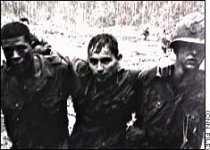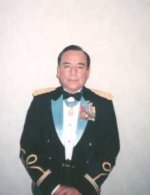Medal of Honor
ALFRED RASCON
Rank and organization: Specialist Fourth Class, U.S. Army, Reconnaissance Platoon, Headquarters Company, 1st Battalion (Airborne), 503rd Infantry, 173d Airborne Brigade (Separate)
Place and date: Republic of Vietnam, 16 March 1966
Born: 1945, Chihuahua, Mexico
Citation:
Specialist Four Alfred Rascon, distinguished himself by a series of extraordinarily courageous acts on 16 March 1966, while assigned as a medic to the Reconnaissance Platoon, Headquarters Company, 1st Battalion (Airborne), 503rd Infantry, 173d Airborne Brigade (Separate). While moving to reinforce its sister battalion under intense enemy attack, the Reconnaissance Platoon came under heavy fire from a numerically superior enemy force. The intense enemy fire from crew-served weapons and grenades severely wounded several point squad soldiers. Specialist Rascon, ignoring directions to stay behind shelter until covering fire could be provided, made his way forward. He repeatedly tried to reach the severely wounded point machine-gunner laying on an open enemy trail, but was driven back each time by the withering fire. Disregarding his personal safety, he jumped to his feet, ignoring flying bullets and exploding grenades to reach his comrade. To protect him from further wounds, he intentionally placed his body between the soldier and enemy machine guns, sustaining numerous shrapnel injuries and a serious wound to the hip. Disregarding his serious wounds he dragged the larger soldier from the fire-raked trail. Hearing the second machine-gunner yell that he was running out of ammunition, Specialist Rascon, under heavy enemy fire crawled back to the wounded machine-gunner stripping him of his bandoleers of ammunition, giving them to the machine-gunner who continued his suppressive fire. Specialist Rascon fearing the abandoned machine gun, its ammunition and spare barrel could fall into enemy hands made his way to retrieve them. On the way, he was wounded in the face and torso by grenade fragments, but disregarded these wounds to recover the abandoned machine gun, ammunition and spare barrel items, enabling another soldier to provide added suppressive fire to the pinned-down squad. In searching for the wounded, he saw the point grenadier being wounded by small arms fire and grenades being thrown at him. Disregarding his own life and his numerous wounds, Specialist Rascon reached and covered him with his body absorbing the blasts from the exploding grenades, and saving the soldier's life, but sustaining additional wounds to his body. While making his way to the wounded point squad leader, grenades were hurled at the sergeant. Again, in complete disregard for his own life, he reached and covered the sergeant with his body, absorbing the full force of the grenade explosions. Once more Specialist Rascon was critically wounded by shrapnel, but disregarded his own wounds to continue to search and aid the wounded. Severely wounded, he remained on the battlefield, inspiring his fellow soldiers to continue the battle. After the enemy broke contact, he disregarded aid for himself, instead treating the wounded and directing their evacuation. Only after being placed on the evacuation helicopter did he allow aid to be given to him. Specialist Rascon's extraordinary valor in the face of deadly enemy fire, his heroism in rescuing the wounded, and his gallantry by repeatedly risking his own life for his fellow soldiers are in keeping with the highest traditions of military service and reflect great credit upon himself, his unit, and the United States Army.
Vietnam Medic gets Medal of Honor
Alfred Rascon ( Center of Photo) March, 1966
Alfred Rascon February, 2000
WASHINGTON (CNN) -- President Clinton on Tuesday 8 February 2000, awarded the nation's highest military award to Alfred Rascon for his bravery more than three decades ago during a skirmish in Vietnam's Long Khanh province.
"Thank you for looking out for people when no one else could be there for them. You have taught us once again that being American has nothing to do with place of birth, racial, ethnic origin, or religious faith. It comes straight from the heart. And your heart, sir, is an extraordinary gift to your country," said Clinton.
Rascon was humble during the Medal of Honor ceremony, noting that the honor belonged to the people who were with him that day. He asked the survivors to stand and be acknowledged at the White House.
"What you see before you is common valor that was done every day. And those of you who served in the military -- and continue to serve in the military -- are very much aware of that. What you do every day, it is duty, honor and country. And I'm deeply honored to be here," Rascon said.
Recipient emigrated from Mexico
The president noted that Rascon was born in Mexico and moved to the United States with his family. The immigrant enlisted in the U.S. Army after graduating from high school in California.
"Alfred was once asked why he volunteered to join and to go to Vietnam when he was not even a citizen. An he said, 'I was always an American in my heart.' Alfred Rascon, today we honor you as you have honored us by your choice to become an American and your courage in reflecting the best of America," said Clinton.
Tuesday's ceremony was long overdue: Rascon was nominated for the medal shortly after his display of valor. But his papers were lost in the Pentagon shuffle for three decades before the men with whom he served found out the honor was never granted.
They say Rascon's receipt of the nation's highest combat decoration is just their way of returning the favor.
Valor, gallantry and heroism
Rascon was a 21-year-old battalion medic with the U.S. Army's 173rd Airborne Brigade on March 16, 1966, when his unit was attacked by North Vietnamese troops. In the fighting that ensued, Rascon repeatedly ran into the line of fire -- treating three men, saving two of them -- despite being wounded himself.
"I happened to have gotten shot, happened to have gotten hit by a hand grenade," he said.
Pvt. Neil Haffey was one of those who credit the self-effacing Rascon with saving their lives. Already wounded, Rascon dove on Haffey as a grenade exploded just five feet away.
"I didn't even know he was gonna do it, and I just turned my head away because I didn't want to see death coming," Haffey said. "I thought I was dead, you know?"
Rascon's heroism turned the tide, rallying his battalion and saving his men, who were carried out of the field by helicopter. Rascon spent six months in Japan recovering from his wounds and received the Silver Star.
Lost in bureaucracy
Rascon's battalion mates recommended him for the Medal of Honor. A few years ago, they discovered he never got his award.
The citation was lost in the Pentagon bureaucracy, and the Army refused to reopen the case. The men of the 173rd turned to Illinois U.S. Rep. Lane Evans, who caught Clinton's ear and won a change of heart from the Army.
"Usually, they had to be considered within two years of the acts," said Evans, who sits on the House Veterans Affairs Committee.
A native of Chihuahua, Mexico, Rascon became a naturalized American citizen in 1967. He returned to Vietnam for a second tour in the 1970s, this time as a military adviser.


